Demain man!
"Preparing the finest surfaces for county play can be a real challenge, yet still be a real thrill"
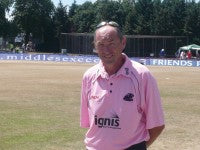 "I'm a great believer in the power of nature to regenerate, and in turf's ability to come back to life." Head groundsman Vic Demain voiced these sentiments whilst gazing out over a baked, brown expanse at Uxbridge Cricket Club, currently Middlesex County Cricket Club's number one outground.
"I'm a great believer in the power of nature to regenerate, and in turf's ability to come back to life." Head groundsman Vic Demain voiced these sentiments whilst gazing out over a baked, brown expanse at Uxbridge Cricket Club, currently Middlesex County Cricket Club's number one outground.
Vic has witnessed such sights before - when the playing surface turns 'white' - and he knew that the four days of rain forecasted following my visit to him in July would prove the remedy for the parched playing surface.
Vic's sanguine approach reflects his generally more relaxed stance towards his daily task of managing the sometimes conflicting demands of, what is, a multi-sport venue.
Passion for his job and a quest for excellence under trying circumstances had conspired to create an inner tension, he reveals, but insists he is "far calmer about things now. I don't let the job get to me as much as it once might have done."
He then expands on his earlier reflection. "I never cease to be amazed by the power of grass to compensate. It's an amazing species. When times are tough, it shuts itself down and just ticks over until conditions improve."
One reason, perhaps, why grass, in one form or another, has populated virtually every square metre possible on the planet.
Vic is now in his fifth season at Uxbridge, having joined in 2006. Before coming into the post, he had enjoyed a multifaceted career, coming into turfcare with "passion but little experience", he confesses.
"I'd worked as a painter and decorator for many years but, once the housing industry slumped, I decided to apply for jobs in groundsmanship. I had little hands-on knowledge or experience but had enthusiasm in droves."
He was lucky enough to land a position at Ascott Park in Buckinghamshire, a job he secured thanks to the coaching qualifications he had gained whilst still in the decorating trade.
Joining there in 1996, he spent eight seasons on, what is, the country estate of financier Sir Evelyn de Rothschild. As joyous as his arrival had been was the shock and disappointment at the news that his "over-zealous" estates manager wanted to move towards a contractor-based operation.
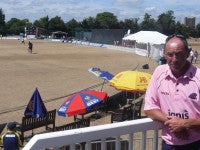 "They wanted to save money, so felt that not employing a full-time groundsman would help them do this - a move I have always felt was a mistake on their part," he explains. Despite efforts to save the position, the deed was done and Vic moved on to work for Richard Bryce (Sports Ground Services) Milton Keynes for two seasons where he looked after Campbell Park, a Northants outground.
"They wanted to save money, so felt that not employing a full-time groundsman would help them do this - a move I have always felt was a mistake on their part," he explains. Despite efforts to save the position, the deed was done and Vic moved on to work for Richard Bryce (Sports Ground Services) Milton Keynes for two seasons where he looked after Campbell Park, a Northants outground.
Vic moved to the position of Head Groundsman at Uxbridge Cricket Club in 2006, and can now claim to be one of the club's longest-serving groundsmen. That fact, in itself, conceals the reality that a high staff turnover has characterised the club over the years.
"It's a challenging club to work at," says Vic candidly, "given the scope of provision here, which includes not only cricket but also tennis, bowls and rugby." A major issue in that legacy has been a lack of continuity in club chairmen, Vic contests. "That's made decision-making problematic. You might agree a strategy with the current chairman one year, then they're gone the next and the new chairman may well have other priorities," he continues.
"The chairman can be drawn from any section of the club, so their knowledge will be confined largely to one particular sport," he adds. "That can make it difficult to secure the right level of investment across all the provision."
Middlesex utilises three outgrounds - Richmond Old Deer Park, Southgate and Uxbridge. The county's first choice, currently, is Vic's domain, sometimes used intensively during the season, and to a level dictated by how many days the county side can play at Lord's, which now, more than ever, plays host to a gruelling calendar of club, test and one-day cricket.
In 2008, Middlesex returned to Uxbridge after around a twelve year absence, during which they played most of their games at Southgate. This return saw Uxbridge host no fewer than twenty-eight days of cricket in that season. Last year saw twenty-two days of action. This year, only six days are in the calendar - two Twenty20 matches (the first, against Hampshire, was played on the day I visited Vic) and a four-day game later in the month that, together, constitute the Uxbridge Festival.
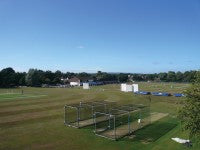 The two cricket squares, one of thirteen strips, the other ten, come in for a fair old battering - being used every day of the week for either club or amateur level cricket. Vic and his "invaluable" assistant, Ramesh Patel, have a tough job of keeping the square up to the standards that cricketers of all levels increasingly demand.
The two cricket squares, one of thirteen strips, the other ten, come in for a fair old battering - being used every day of the week for either club or amateur level cricket. Vic and his "invaluable" assistant, Ramesh Patel, have a tough job of keeping the square up to the standards that cricketers of all levels increasingly demand.
"Preparing the finest surfaces for county play can be a real challenge, yet still be a real thrill," says Vic, "because I'm seeking to provide bounce, pace, spin, seam and consistency. We can only try and do the best job we can with, what is, a very limited budget."
"When I do need something extra, I have to go to the committee and, in most cases, our requests are turned down."
Not one to moan about his plight, Vic is professional enough to know that he just has to get on with the job in hand. "When Middlesex come here, they take over the ground. That's the way it is. You'll never be able to control them, just mop up afterwards," he jokes.
Given the daily grind of matches, Vic's key priority is to try and protect the main square as much as he can and to maintain standards. With the rugby pitch, bowls green and grass tennis courts to manage to boot, he knows that he has to devote the level of care and attention to the cricket surfaces that will deliver results.
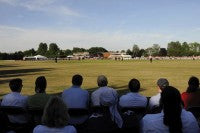 "It's a bit of a change from my positions at Ascott Park and Campbell Park, as I have to tend to these facilities in the same timespan as I used to look after just one cricket pitch - and here we have around 500 club members to keep happy as well," he explains.
"It's a bit of a change from my positions at Ascott Park and Campbell Park, as I have to tend to these facilities in the same timespan as I used to look after just one cricket pitch - and here we have around 500 club members to keep happy as well," he explains.
For the four-day games, Vic likes to leave a little more grass on the pitch and allow for a tad more bounce, particularly on the first day. "It can get a little one- sided if we're not careful," he says.
"For Twenty20 games, my aim is to produce wickets as dry and hard as possible - everyone wants to see the runs pile on, so we'll aim for a wicket that can generate at least 120 an innings."
His wish came true in the Hampshire game although the result may not have suited him - Middlesex ramped up a total of 165, but were outflanked by their opponents Hampshire, losing by three wickets.
"I like the strip ready two days before the event so we can keep it as hard as possible. If rain does come in the run-up, we have a large Blotter ready in the shed and plenty of cover, so we can be out playing after only a couple of hours if we need to."
Once the Festival, which attracts crowds of up to 3,000 a day, is over, the first task is to apply water to the ground, and especially the square, by hose or sprinkler, as Uxbridge are unlikely ever to see the scale of outfield irrigation that is transforming the top venues.
With only an inch of topsoil, then gravel below that, the surface turns a bright white in hot summers as the grass shuts down and lies dormant.
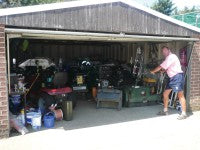 With daily irrigation on the squares, his wickets turns into, what Vic calls poetically, "an oasis of green in the centre of a white desert," scenes reminiscent of the Oval in the unprecedentedly dry summer of 1976, he recalls - a period many will remember for the appointment of Labour MP and avid cricketer Denis Howell as Minister for Drought, and the Government's plea to the nation to 'Bath with a friend' to save water.
With daily irrigation on the squares, his wickets turns into, what Vic calls poetically, "an oasis of green in the centre of a white desert," scenes reminiscent of the Oval in the unprecedentedly dry summer of 1976, he recalls - a period many will remember for the appointment of Labour MP and avid cricketer Denis Howell as Minister for Drought, and the Government's plea to the nation to 'Bath with a friend' to save water.
With so many fixtures, and Uxbridge first and second elevens using the main square, Vic stresses the need for caution to balance the desire for hard surfaces with simply keeping the grass alive when so little rain has fallen.
Irrigation is something that Vic wishes he had more control over though. "The outfield is not in great shape at the moment - it's built to a very 'old school' design and, unfortunately, we don't have irrigation to deal with the dry spells. It'll be a long time before we see the benefit of ECB grants to transform the outfield," he adds wistfully.
"It's something we have to live with - there's no point getting worked up about things you can't control, so I don't worry about it anymore." The angst of a turfcare professional, clearly frustrated by a predicament unlikely to change anytime soon, is tangible enough to touch.
Vic is a man who likes to go back to basics, advocating the benefits of the hands-on approach. "I'm a big fan of hand-scarifying, and we also brush and rake manually each day," he explains. "It's a practice used widely at Lord's, and something that's not done enough these days. The younger groundsmen prefer to use ride on mowers instead of getting down on their hands and knees," he says stridently.
Benefitting from one assistant over the summer, Vic must knuckle down for the rest of the year to complete the necessary tasks himself. Despite that, he relishes the challenge and recognises his need to ensure standards always remain high - "the long hours are a part of the job you just have to accept."
Still fired with enthusiasm as he turns fifty, Vic fears for the prospects of an 'ageing' industry. "I have real worries about the future and the role of the full-time groundsman at this level. I don't see youngsters coming into the job in the numbers that they need to be. We are expected to work 12 to 14-hour days for little financial reward, and that's something that just doesn't appeal to younger people now," he states.
Such a trend could cause a snowball effect, and he fears that standards will fall if there are moves to a contractor-led industry. "In a sector like ours, it has be a labour of love to put the hours in and, for many youngsters, I don't feel the passion is there. Not enough is being done to really address the issue."
The future of the groundsman is a subject close to Vic's heart, and one he's become increasingly more active in over the last few years, believing that disillusionment over workload, or their career futures, can set in all too easily. "We're looking over our shoulders more now than ever, so we can't afford to get complacent. Top men like Phil Frost at Somerset, Mike Garnham at Kent and Lawrence Gosling at Sussex have lost their jobs controversially, prompting the onset of the First Class Groundsman's Conference," he explains.
February saw the annual meeting of the ECB Groundsman Conference when, high on the agenda, were issues such as how to protect groundsmen from being chopped unceremoniously after long years of service.
Talks of union membership were rife, Vic reports, with UNITE, among others, aired as possibilities, whilst talks surfaced of involvement with the Professional Cricketers Association - the players union - to reflect the reality that turfcare professionals are now seen as part and parcel of 'the team'.
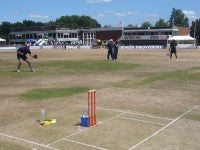 The Uxbridge site sits, like many a London counterpart, on heavy London clay. Whilst this material might provide an optimum substrate for cricket, which favours a hard base, it has caused untold problems for one of the club's other sports facilities - the rugby pitch.
The Uxbridge site sits, like many a London counterpart, on heavy London clay. Whilst this material might provide an optimum substrate for cricket, which favours a hard base, it has caused untold problems for one of the club's other sports facilities - the rugby pitch.
Leased from Hillingdon Borough Council two years ago, the pitch has proved one of Vic's and the club's, biggest headaches. "We've managed only eleven games on it in two years," he admits.
The problems started following the lease agreement, when the council agreed to install a new drainage system to help solve the problem of drainage from the clay-base pitch.
Unfortunately, the design proved to be "insufficient and totally inadequate for the needs of the club and the teams that play there. We're now locked in an ongoing battle with the council to remedy the problem, and a series of poor winters, coupled with the inadequate drainage, has resulted in few games being played and, ultimately, costing us a lot financially," Vic explains.
The council have since tried to remedy the problem with sand banding, he goes on but, as the job was undertaken "at the wrong time of year", it has been unsuccessful. "The pitch was getting so bad, we called in Keith Kent, head groundsman at Twickenham, to give us a second opinion. His diagnosis was a pitch that was totally unfit for purpose." The upshot is that Uxbridge is forced to hire other rugby pitches to complete its fixtures.
Luckily for Vic, not all the site's pitches cause as sticky a problem as rugby has. In contrast, tennis provision has come on leaps and bounds since Vic took over. "The grass courts here appeared to have always been treated as somewhat of an afterthought. So I made it a goal of mine to get them up to a good standard," he states. The club has three grass courts and five tarmacadam ones, yet fears linger that the days of lawn tennis at Uxbridge may end soon as real grass gives way to all-weather surfaces. "I've had an ongoing discussion with our tennis coach who's been pushing the idea of replacing the grass with a hard surface, to allow for year round play" explains Vic. "The thinking behind it is mainly due to the revenue capacity for hard courts over grass, as all-weather surfaces allow greater winter use. Yet, when the £60,000 installation cost and maintenance overheads are accounted for, grass works out no more expensive to run, whilst one understands the logic, the change would cause a huge outlay," he adds.
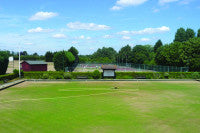 "The life of a tarmacadam or artificial grass court is usually around ten years, depending on use and maintenance, something which people often overlook when replacing grass with other surfaces. In many instances, it might be better to stay put and make the most of what is fast becoming a rarity across multi-use sports sites."
"The life of a tarmacadam or artificial grass court is usually around ten years, depending on use and maintenance, something which people often overlook when replacing grass with other surfaces. In many instances, it might be better to stay put and make the most of what is fast becoming a rarity across multi-use sports sites."
Preparing the bowls green is another aspect of his job that has thrown up its fair share of challenges for Vic. He had never had experience of tending a surface renowned for being hugely labour intensive so, for him, the challenge has been in balancing how he allocates his time.
"The sand construction of bowls greens was something I'd never dealt with before, so it's been the most technically challenging side of the job for me. I've been lucky to have contact with Mark Hammond, a man very experienced in preparing these surfaces, who I contacted through the Pitchcare website. Although he is based in Lincolnshire, I speak with him almost daily by email and he's helped me tremendously. It proves to me the value of sharing ideas within our industry."
As a result of their brainstorming sessions, Vic has greatly reduced the volume of rolling on the bowls green, which is showing signs of success. "Since I've become more aware of the green reforms, we only use a turf iron as opposed to the rollers previously used on the surface"
Whilst mostly working alone, Vic has, over the years, established valuable contacts, who have helped him improve his skills and also balance his busy summer workload. Stuart Kerrison, Head Groundsman at Essex CCC in Chelmsford, who chaired the groundsmen's meeting earlier this year, has been an important sounding board for Vic.
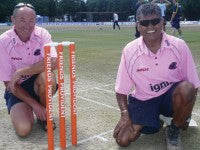 But, two assistants in particular have made a huge impact, he notes. The first is twenty-two year-old New Zealander, Simon Harvey, who Vic praises unstintingly as "the most knowledgeable groundsman I've ever come across," adding, "his first visit to the UK, in 2008 - he was only here for five months - was an invaluable source of help and information to me, and was keen to get involved in first-class pitches. We keep in regular contact now and share ideas."
But, two assistants in particular have made a huge impact, he notes. The first is twenty-two year-old New Zealander, Simon Harvey, who Vic praises unstintingly as "the most knowledgeable groundsman I've ever come across," adding, "his first visit to the UK, in 2008 - he was only here for five months - was an invaluable source of help and information to me, and was keen to get involved in first-class pitches. We keep in regular contact now and share ideas."
Over the longer term, Vic's biggest influence has been Ramesh Patel, who he met by chance in 1986 while attending a cricket coaches course at Lilleshall Abbey.
Despite spending a week together, the two didn't remember one another until years later. The 55-year old Patel is now in his second season at the club and he and Vic have struck up a great partnership. "Without those two, I would not be here right now," says Vic. "They've been a tower of strength in the face of many problems we've faced."
